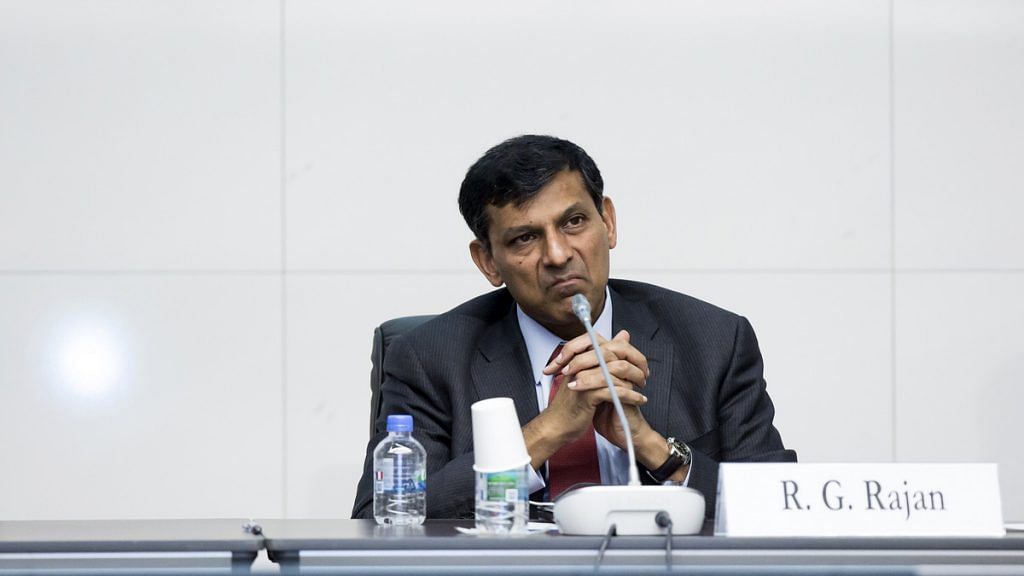New Delhi: The Indian economy has become too big to be run from the Prime Minister’s Office (PMO), former Reserve Bank of India (RBI) governor Raghuram Rajan has said in criticism of the concentration of power in the Narendra Modi government.
“India has become too big an economy to be run from the top. And unfortunately the experience so far is that it simply doesn’t work,” Rajan said.
The former RBI governor made the comments Friday while delivering the second of the two-part OP Jindal lecture on the Indian economy at the Watson Institute of International and Public Affairs, Brown University, US.
“This government is extremely centralised which puts a lot of pressure on the leadership. The leadership doesn’t have a consistent and articulated vision on how to achieve economic growth,” he said.
There is much more centralisation of power not only in the central government but within it in the PMO, added Rajan.
“Today what we have is a PMO which essentially works through the bureaucracy. The ministerial level is often bypassed. Ministers are disempowered for the most part,” he said, adding that civil servants are typically unwilling to take decisions on their own and don’t have strong ideas for reforms.
The former central bank governor added the Modi government has a strong political vision, but there is no clarity on the economic vision.
“There is a lot of uncertainty about the overall economic vision at the top. Maybe there is a vision that is coherent but we don’t know about and there is mixed follow through below,” he said, highlighting the limited capacity of the PMO.
Rajan’s comments come at a time when growth in the Indian economy has slowed to a six-year low of 5 per cent in the June quarter of 2019-20 and full-year growth is expected to be only around 6 per cent.
Also read: Raghuram Rajan says India losing its economic way, fiscal deficit ‘conceals’ a lot
On majoritarianism
In his speech, Raghuram Rajan criticised the “divisive populist majoritarianism” of the Modi government over issues ranging from scrapping of Article 370 in Jammu and Kashmir to targeting of opposition leaders with the help of investigative and tax agencies, and of former civil servants for past decisions.
He said majoritarianism may win elections for a while but it is taking “India down a dark and uncertain path”.
Rajan also warned that India risks following the Latin American countries by using populist spending to “buy legitimacy for authoritarian governments”.
India needs to strengthen its democracy and institutions rather than giving into the allure of authoritarianism, he added, pitching for depoliticising appointments to important institutions like the Supreme Court, investigative bodies and even educational institution posts.
On banking
The Modi government may have reiterated that banks are free to take their own lending decisions based on commercial reasons, but it has imposed mandates on them to further its political gains, Raghuram Rajan said during the lecture.
After assuming office in 2014, the Modi government had promised that bankers would be free to take commercial decisions and there wouldn’t be phone calls from New Delhi asking them to lend to certain big borrowers.
However, the former RBI governor said new programmes imposed on banks, like Mudra where each branch is given a target for giving loans under the scheme, force them to move away from commercial principles of lending.
“It’s not lending to my friend but lending to a constituency that I like or lending to the political affiliations that I like. That becomes problematic because those loans to the small and medium sector are now in trouble. That is why RBI is now exercising forebearance over them,” he said.
However, the problem of exercising forebearance is that it doesn’t reduce the number of bad loans but almost always increases it, he added.
“We are going to even less commercial principles… We are going to the era of loan melas,” Rajan said, in a reference to an outreach programme of Union Finance Minister Nirmala Sitharaman.
Also read: India’s top bankers keep saying the worst is over, but it only keeps getting worse
